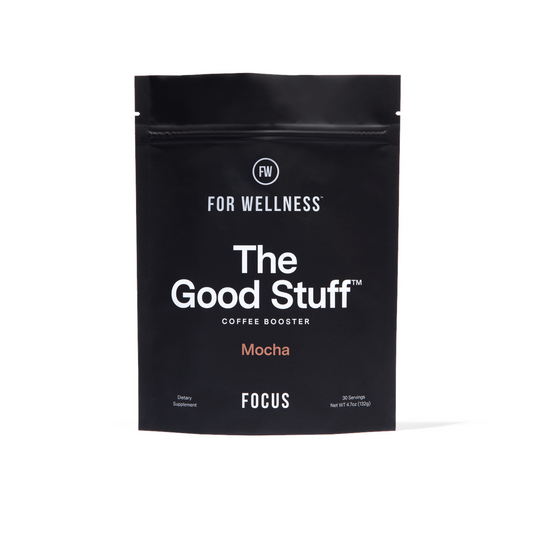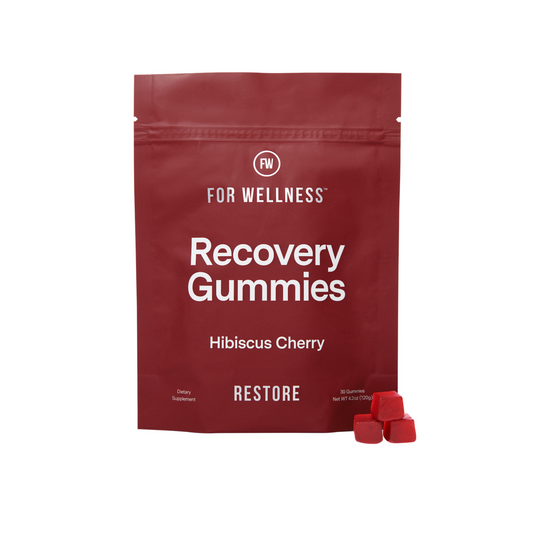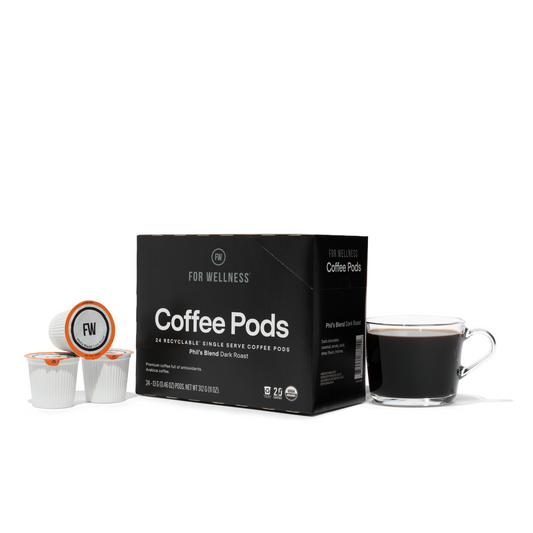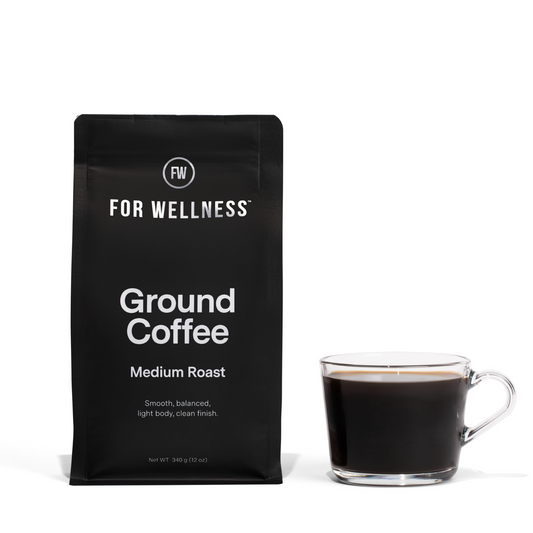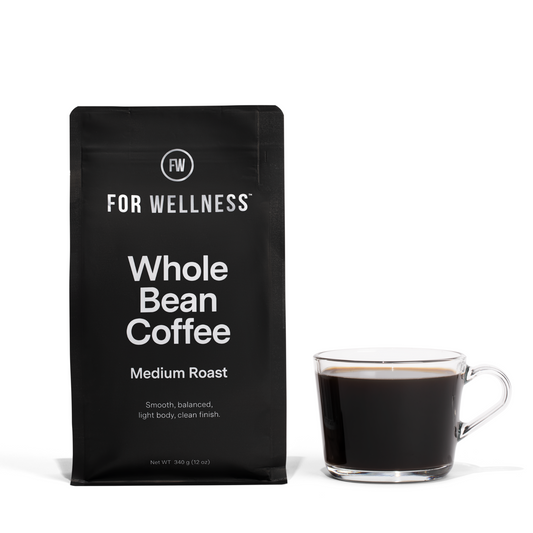Coffee is one of the world's most popular beverages, consumed by millions of people every day. It's not just a delicious drink that provides an energy boost, but it can also have a positive impact on your brain function. Many studies have shown that coffee can improve memory, concentration, and overall cognitive performance.
Whether you're a student looking to study for an exam or a professional trying to stay focused at work, coffee may be just what you need to enhance your mental capabilities. In this article, we'll explore the science behind coffee's effects on the brain and uncover the benefits of incorporating it into your daily routine.


The Good Stuff - Performance
-
One scoop will infuse your coffee with healthy ingredients
-
Ditch the bad stuff like sugar, dairy, and artificial creamers
-
Fights inflammation and supports skin and joint health
-
Makes your coffee taste great
Coffee Can Improve Cognitive Function
Caffeine stimulates the central nervous system (CNS). It does this by interacting with the receptors that send out adenosine.
Adenosine is the neurotransmitter in your brain that makes you sleepy. This neurotransmitter generally builds up over the course of a day and makes you sleepy by the end of it by lowering neural activity.
Caffeine has a very similar molecular structure to adenosine, but it doesn't slow down your neural activity. Instead, it increases this activity so you can feel energized. When you ingest caffeine, it binds to the receptors that adenosine would otherwise bind to.
Studies examining this suggest that you'll feel stimulated instead of sleepy. Routine coffee drinkers tend to back this up with their own experience!
Caffeine also increases something called "resting brain entropy." This is what lets your brain function understand and process information around you.
When you increase your resting brain entropy, you'll have an easier time processing information. This includes visual, auditory, and tactile information. It also includes what people say to you and short-term recollections of things you learn.
Better Concentration
It's no secret that those who are sleepy have poor concentration. Research shows that even those who have only one bad night's sleep will have impaired focus. They'll also have trouble ignoring other distractions while at home or at work.
Replacing adenosine helps you feel less sleepy so you can focus better. Caffeine also triggers your brain into producing and releasing dopamine, which makes you more alert.
Higher Energy Levels
Your bloodstream absorbs any caffeine that you consume through your gastrointestinal tract. This tract connects to your circulation and allows it into your blood flow. Once the caffeine is in your blood, your body carries it throughout your entire body as well as your brain.
Tufts University researchers find that your blood's caffeine concentration will peak within 15 minutes and 2 hours. This will give the person a boost of energy that will be at its highest during the peak period of 2-12 hours.
This may make you:
- Become more excited about learning new things
- Make you more physically active
- Make you more interested in the tasks you must complete
- Stimulate learning processes so you can work faster
- Boost your mind to stay alert, focused, and task-oriented
Part of this is because caffeine block specific receptors in the region of your brain linked with multiple types of learning. This is why you get a boost. It all comes down to brain chemistry!
Less Mental Fatigue
Mental fatigue is somewhat different than physical exhaustion. Your body can remain alert and awake while your mind is exhausted.
Brain fog can be debilitating to those who have to work or be social. It also can be really irritating and frustrating to feel out of control of your own thoughts and behaviors.
Coffee can work wonders when it comes to nipping mental fatigue in the bud. Some research suggests that drinking just 100 milligrams of caffeine will stop the worst of mental fatigue from slowing you down. Caffeinated coffee drinkers also found that they have fewer headaches than those who were given decaffeinated coffee or a placebo.
A daily cup of coffee can keep your brain power on at full blast throughout the day. You'll feel great and be more ready to tackle your everyday tasks.
Quicker Reaction Times
A University of Waterloo study examined whether caffeine could improve people's visual skills. Participants were asked to detect moving targets and their locations.
The researchers concluded that those who had consumed caffeine (such as in coffee) could detect the targets more quickly than those who had not had caffeine. They also found that participants' reaction times increased. They responded to their environments faster.
This is important because people are constantly surrounded by movements that impact their everyday lives. Spotting pedestrians at crosswalks, maneuvering your cart through a retail store, and interacting with walking strangers all require responsiveness.
Caffeine can help you get through your day more quickly. It can help you be more present at any given time. You'll be able to better navigate your fast-paced surroundings.
Coffee Can Improve Your Mood (as Well as Your Brain Power)
Coffee stimulates a neurotransmitter called dopamine. Dopamine is sometimes called the 'feel-good neurotransmitter' because it gives you pleasant feelings of happiness, contentment, and even euphoria. This is the primary reason your morning cup of coffee immediately makes you feel amazing.
Coffee also has antioxidant properties and can prevent inflammation. This will make you feel fresher and more alert, and the energy boost will naturally make you more active. An active mind has more to do, makes you more productive, and lets you do exciting and rewarding things.
According to European Food Safety Authority (EFSA) studies, adults who drink coffee frequently throughout the day will be in better moods. Their research concluded that the prime amount of coffee was about 75mg (2/3 of a cup) every 4 hours.
Short-Term Mood Boosts: What Do They Look Like?
The mood boosts associated with coffee have several different short-term benefits. Some of the most important include:
- Heightened interest in daily activities
- Feeling less overwhelmed by work and everyday tasks
- More energy and productivity
- Lower levels of irritability (so you can foster better connections)
- Better self-image
These are all signs that your mental health is improving, and coffee can be a great catalyst for this process.
Mood boosts also have a tangible impact on workplace productivity. About 28% of survey respondents say that coffee makes them more efficient at work. Workers are also about 13% more productive when they're happy, which is likely related to the mood boost from caffeine.
Studies also show that drinking coffee 60-90 minutes after you wake up ensures that you get both the cortisol needed to wake naturally and the caffeine boost that can increase your alertness even more.
Decreasing the Risk of Depression
In addition to boosting mood in the short term, studies suggest that caffeine may decrease the risk of clinical depression in the long term. One 2011 study found that the risk of depression decreases over time for women who regularly consume caffeinated coffee.
It did this by measuring 50,739 clinically healthy women over 10 years, some of whom drank coffee and some of whom did not. 2607 developed depression during this timeframe. Those who drank coffee developed fewer depressive symptoms over time than those who did.
Leading neurology researchers at Harvard University quantified this. Their findings showed that those who drink coffee are about 1/3 less likely to develop depression than those who do not.
So, in addition to short-term mood boosts, you'll also have the long-term benefit of decreasing depression risk.
How Much Coffee Will Give You a Boost?
Coffee is best when you drink it in moderation.
If you consume any stimulant in excess, it could prove unsafe. Too much coffee will increase your heart rate so much that you become restless and shaky. You will also likely have insomnia and headaches if you overuse coffee.
Luckily, experts say these symptoms only usually come if you drink 5+ cups of coffee in a short timeframe. A cup every few hours isn't going to create these problems. Just parse out your consumption throughout the day.
Generally, 2 cups of coffee are the minimum you'll need to drink for a noticeable mood boost. According to one Korean study, 2 cups can decrease self-reported depression by about 32%. People report that they are less sad and down when they have coffee.
Those who have 2-5 cups of coffee daily will gain all these benefits without compromising their mental and physical well-being.
You'll Get a Memory Boost With Your Daily Cup of Coffee
Coffee can help you improve your memory in several different ways. According to Oxford researchers, caffeine gives you more serotonin and a brain chemical called acetylcholine. These chemicals make you happy and carry messages to nerves throughout your body.
The mood boost of serotonin stimulates the brain. While stimulated, the brain will transmit strong messages throughout the body, especially your bloodstream. This helps to build a stronger connection between your brain and blood and stabilizes this barrier.
However, caffeine isn't the only memory-boosting coffee ingredient. A cup of coffee also contains polyphenols, which are micronutrients that also naturally occur in fruits and veggies. They're antioxidants that combat stress and stress-related tissue damage.
Polyphenols, Memory, and Stroke Risk
Many studies suggest that polyphenols may prevent tissue damage due to free radicals. They might also stop the blood vessels in your brain from being blocked.
In these ways, researchers believe that this coffee ingredient could combat the risk of strokes. This is further backed up by Korean studies that cite coffee consumption as a factor that may proactively protect against strokes in middle-aged women.
Finally, trigonelline- a natural substance in coffee beans- can increase antioxidants inside your system. This is yet another way to protect your blood vessels and stop inflammation.
Free blood flow to and from the brain opens pathways that will improve your cognition and memory. You'll have an easier time recalling information and activities later.
Short-Term Coffee Benefits for Memory
These chemicals mean that coffee (and caffeinated energy bites) boosts your short-term memory. In addition to being more aware and alert, you'll have a sharper recollection of events that transpired since you drank the coffee.
Memory is, however, complex. If you drank some coffee during the encoding and retrieval processes, your brain will store it longer than it would without the coffee.
You'll need to drink caffeine during the appropriate part of the memory process if you want to feel the full impact. Luckily, that's easy because you'll be given multiple things to recall even while drinking a single cup.
So, you'll remember events and information for a few extra days when you lean on caffeine!
The study that found these results also tested those who drank coffee once vs. those who drank it multiple times. Multiple-time users recalled more pairs of words they were given to remember previously than those who only had one cup.
You'll probably have a steadily good memory if you're a regular coffee drinker and have a daily cup of coffee. If you use it once, you'll get some benefits, though not the full effect. It's a good idea to make a cup of joe more routine than a one-off.
A Long-Term Memory Enhancer
A 2021 study also examined the impacts of caffeine on long-term memory. As we previously discussed, they found that it greatly boosted cognitive function.
When information is presented passively, it's easy for people to forget it in the short term. Coffee enables you to learn passively-presented tasks and remember how to perform them. This is true in addition to boosting information recall.
Remembering these tasks can make long-term learning easier. You'll be able to develop skills more quickly and use them throughout your life.
The study also found that caffeine may improve how well people perform tasks. If someone does not drink coffee, they may struggle to utilize their working memory to complete given tasks. However, those who drink coffee regularly will have more access to working memory and complete tasks more accurately and efficiently.
Iced coffee will also give you these same benefits in the summer heat. Memory enhancement isn't seasonal!
Prevention of Alzheimer's and Dementia
With the memory-enhancing cognitive effects of caffeine, it should come as no surprise that it may prevent long-term memory loss disabilities like Alzheimer's. 2015 researchers explored the impacts of the psychoactive stimulant on elderly populations at risk for dementia.
Cross-sectional studies and longitudinal population-based data suggested that coffee may act as a protective barrier against the onset of these conditions. While this is not always true, the link is too strong to ignore.
Another study quantified this information more precisely.
While other studies may not be completely consistent in their results, a CAIDE study of information found that 3 in every 5 researchers found that coffee stopped cognitive decline to some degree. They looked at consumption habits and saw that drinking 3-5 cups of coffee daily in midlife decreased the risk of Alzheimer's by about 65%.
While experts are still tackling the link between cognitive disabilities in later life and coffee, the connection looks pretty strong.
Coffee Changes Your Brain Structure
A single cup of coffee will give you more brain power in the short term. However, it won't alter your brain chemistry or structure in the long term. On the other hand, regular coffee drinkers will see overarching changes to their brain's structure that can benefit them.
University of Basel researchers in Switzerland studied caffeine's impact on brain gray matter. "Gray matter" is a type of brain tissue that connects your brain to your spinal cord. It has high concentrations of neuronal bodies, nerve endings, and dendrites that make your central nervous system function properly.
Twenty people (all regular coffee drinkers) were given tablets to take over the course of two 10-day stretches. Ten were given caffeinated pills, while the other ten were given a placebo.
They all got brain scans after the study. Researchers saw from these scans that those who had caffeinated pills had less gray matter in their brains than those who had a placebo tablet. This was extremely obvious in the area of the brain that consolidates memory.
These changes to the brain structure were temporary. The regular coffee drinkers at the beginning of the study gained excess gray matter from that coffee after ten days without caffeine. Still, this is an interesting comparison that shows how huge of an impact coffee can have.
This is the core takeaway from the study. The leading researcher, Dr. Carolin Reichert, noted that less gray matter does not mean that caffeine has a negative impact on the brain. All it shows is that coffee impacts our cognitive hardware, which is something that we should research further.
And, given the impact of the other studies we've talked about, these changes are likely a good thing.
The Medical Impacts of Functional Brain Changes
A 2021 study found that shifts in brain chemistry stemming from coffee can improve motor control. Researchers used fMRI technology to examine the brain's limbic resting and somatosensory states. They examined both regular coffee drinkers and those who didn't drink much caffeine.
Coffee drinkers had reduced connectivity in these brain areas. This means that they would have higher motor control than their coffee-free counterparts.
The researchers also discovered that there is more dynamic activity in some regions of the brain for those who drink coffee. They had more activity in multiple subcortical and cerebellar areas. This is correlated with the ability to focus as well as motor control.
Your Brain's Neural Network
Another scientific study assessed 21 adults with electroencephalography (EEG). EEG uses electrodes to measure electrical activity in the brain. Since brain cells communicate with neurons and with the body via electrical impulses, EEG lets researchers see differences in brain structure and function.
The researchers believed that coffee was making the brain's neural connections stronger. They looked at the brain half an hour before coffee consumption and half an hour after. They then graphed out the differences in electrical activity and performed correlation analyses on their data.
In the end, the study suggested that coffee may have beneficial effects on executive function in the long term. Brain scans showed more efficient neural networks after coffee consumption, especially when compared to baseline function. Coffee drinkers had a different, more efficient brain structure than those who did not drink caffeine.
Researchers also performed cognitive tests on participants before and after coffee consumption. Those who drank coffee performed better on both tests, and this improvement correlated with the brain scans' changes.
Coffee makes your brain faster at processing information, more cohesive, and better able to send commands to the body and receive sensory data. Your internal cognitive network will be more interconnected when you consume it regularly.
Improve Your Brain Function With Coffee Today
Coffee is more than just a delicious morning drink. It's also a great way to give your cognitive health a boost. Now that you know how your daily cup of coffee can improve brain function, memory, mood, and more, it's time to get started.
For Wellness is committed to providing you with delicious coffee that gives your brain a daily boost.



